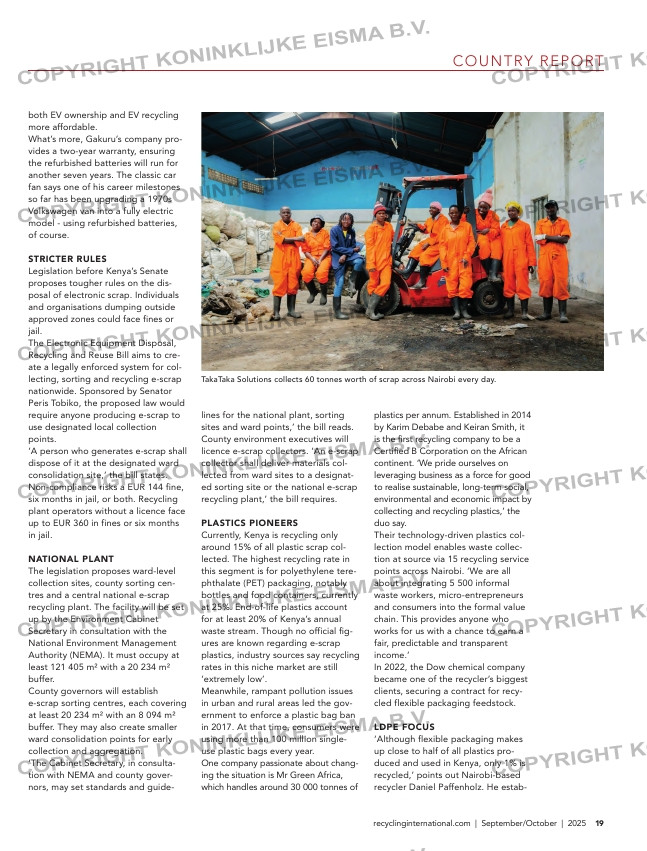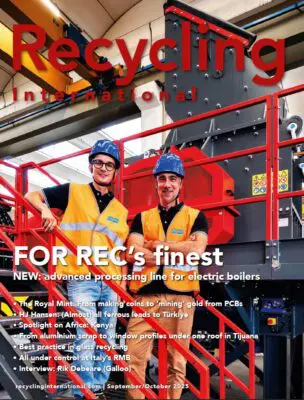Page 19 from: Recycling International September/October 2025

COUNTRY REPORT
19recyclinginternational.com | September/October | 2025
both EV ownership and EV recycling
more affordable.
What’s more, Gakuru’s company pro-
vides a two-year warranty, ensuring
the refurbished batteries will run for
another seven years. The classic car
fan says one of his career milestones
so far has been upgrading a 1970s
Volkswagen van into a fully electric
model – using refurbished batteries,
of course.
STRICTER RULES
Legislation before Kenya’s Senate
proposes tougher rules on the dis-
posal of electronic scrap. Individuals
and organisations dumping outside
approved zones could face fines or
jail.
The Electronic Equipment Disposal,
Recycling and Reuse Bill aims to cre-
ate a legally enforced system for col-
lecting, sorting and recycling e-scrap
nationwide. Sponsored by Senator
Peris Tobiko, the proposed law would
require anyone producing e-scrap to
use designated local collection
points.
‘A person who generates e-scrap shall
dispose of it at the designated ward
consolidation site,’ the bill states.
Non-compliance risks a EUR 144 fine,
six months in jail, or both. Recycling
plant operators without a licence face
up to EUR 360 in fines or six months
in jail.
NATIONAL PLANT
The legislation proposes ward-level
collection sites, county sorting cen-
tres and a central national e-scrap
recycling plant. The facility will be set
up by the Environment Cabinet
Secretary in consultation with the
National Environment Management
Authority (NEMA). It must occupy at
least 121 405 m² with a 20 234 m²
buffer.
County governors will establish
e-scrap sorting centres, each covering
at least 20 234 m² with an 8 094 m²
buffer. They may also create smaller
ward consolidation points for early
collection and aggregation.
‘The Cabinet Secretary, in consulta-
tion with NEMA and county gover-
nors, may set standards and guide-
lines for the national plant, sorting
sites and ward points,’ the bill reads.
County environment executives will
licence e-scrap collectors. ‘An e-scrap
collector shall deliver materials col-
lected from ward sites to a designat-
ed sorting site or the national e-scrap
recycling plant,’ the bill requires.
PLASTICS PIONEERS
Currently, Kenya is recycling only
around 15% of all plastic scrap col-
lected. The highest recycling rate in
this segment is for polyethylene tere-
phthalate (PET) packaging, notably
bottles and food containers, currently
at 25%. End-of-life plastics account
for at least 20% of Kenya’s annual
waste stream. Though no official fig-
ures are known regarding e-scrap
plastics, industry sources say recycling
rates in this niche market are still
‘extremely low’.
Meanwhile, rampant pollution issues
in urban and rural areas led the gov-
ernment to enforce a plastic bag ban
in 2017. At that time, consumers were
using more than 100 million single-
use plastic bags every year.
One company passionate about chang-
ing the situation is Mr Green Africa,
which handles around 30 000 tonnes of
plastics per annum. Established in 2014
by Karim Debabe and Keiran Smith, it
is the first recycling company to be a
Certified B Corporation on the African
continent. ‘We pride ourselves on
leveraging business as a force for good
to realise sustainable, long-term social,
environmental and economic impact by
collecting and recycling plastics,’ the
duo say.
Their technology-driven plastics col-
lection model enables waste collec-
tion at source via 15 recycling service
points across Nairobi. ‘We are all
about integrating 5 500 informal
waste workers, micro-entrepreneurs
and consumers into the formal value
chain. This provides anyone who
works for us with a chance to earn a
fair, predictable and transparent
income.’
In 2022, the Dow chemical company
became one of the recycler’s biggest
clients, securing a contract for recy-
cled flexible packaging feedstock.
LDPE FOCUS
‘Although flexible packaging makes
up close to half of all plastics pro-
duced and used in Kenya, only 1% is
recycled,’ points out Nairobi-based
recycler Daniel Paffenholz. He estab-
TakaTaka Solutions collects 60 tonnes worth of scrap across Nairobi every day.
16-17-19-20-21-22_africa_kenya.indd 19 09-09-2025 09:41



